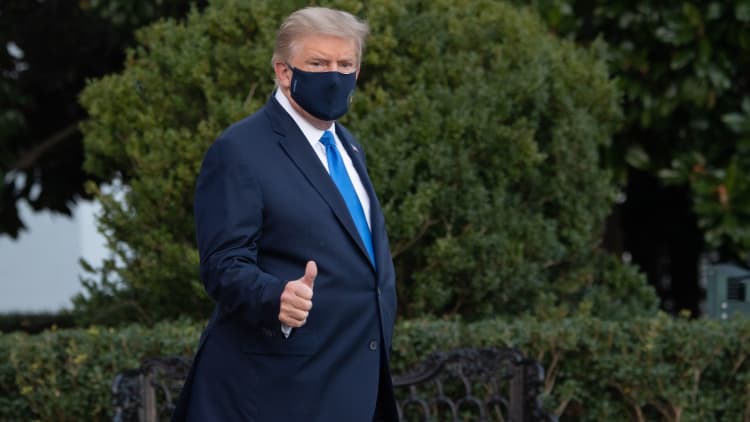President Donald Trump's condition has improved since receiving care at Walter Reed Medical Center after testing positive for the coronavirus, Trump's physician, Dr. Sean Conley, said on Saturday.
Conley's relatively positive words, though, stood in contrast to other signals out of the White House.
"At this time the team and I are extremely happy with the progress the president has made," Conley said. "Thursday he had a mild cough and some nasal congestion and fatigue. All of which are now resolving and improving."
But a source told reporters that there remains great concern about the president's condition.
"The president's vitals over the last 24 hours were very concerning and the next 48 hours will be critical in terms of his care," a person familiar with the matter told the White House pool, a small group of reporters who travel with the president on behalf of all the news outlets who cover the White House.
"We are still not on a clear path to a full recovery," the person said.
Conley did not commit to giving a firm date for a potential discharge for the president.
Trump tweeted shortly after the press conference, saying that he is "feeling well." The president has rarely tweeted since he announced his coronavirus diagnosis.
The briefing raised new questions about when it was known that the president was sick. Conley told reporters on Saturday that Trump was 72 hours into his diagnosis, which would indicate it was made before early Friday morning, which is when Trump announced his positive test.
"Just 72 hours into the diagnosis now. The first week of Covid, and in particular day seven to 10, are the most critical in determining the likely course of this illness," Conley said.
Trump's medical team also said a treatment was given to the president 48 hours ago, which would've been on Thursday before his positive diagnosis was announced.
The White House sought to clarify the timeframes, saying that Conley meant day three and not 72 hours. Conley later issued a memo that said:
"This morning while summarizing the President's health, I incorrectly used the term 'seventy two hours' instead of 'day three' and 'forty eight hours' instead of 'day two' with regards to his diagnosis and the administration of the polyclonal antibody therapy. The President was first diagnosed with COVID-19 on the evening of Thursday, October 1st and had received Regeneron's antibody cocktail on Friday, October 2nd."
Top Trump aide Hope Hicks, who spends a lot of time with the president, tested positive Thursday morning. Later that day, Trump flew to New Jersey to participate in a fundraiser at his Bedminster golf club.
Dr. Sean Dooley, a pulmonologist at Walter Reed, said that the president is not using supplemental oxygen and is not having difficulty breathing. The doctors would not comment on whether Trump had received oxygen at all.
"He's in exceptionally good spirits and in fact as we were completing our multidisciplinary rounds this morning the quote he left us with was, 'I feel like I could walk out of here today.' And that was a very encouraging comment from the president," Dooley said during Saturday's briefing.
Trump's coronavirus diagnosis was announced just before 1 a.m. ET on Friday. Conley later said in a statement that Trump received a single, 8-gram dose of Regeneron's antibody cocktail, which has not been granted an emergency use authorization from the Food and Drug Administration.
Trump's oxygen level dropped Friday, and he received supplemental oxygen at the White House before he was transferred to Walter Reed, according to New York Times reporters. A source familiar with Trump's condition told NBC News that some of the president's vital signs that morning indicated the coronavirus could progress beyond mild illness.
Late on Friday evening, as Trump spent the evening at Walter Reed, it was announced that he also received antiviral drug Remdesivir, which has emergency approval from the FDA but is typically used for hospitalized coronavirus patients who are severely ill.
"Remdesivir works a little bit differently than the antibodies. We're maximizing all aspects of his care, attacking this virus multipronged approach," Conley said. "As the president, I didn't want to hold anything back. If there was any possibility that it would add value to his care and expedite his return then I wanted to take it."
Conley also said Trump had a fever "Thursday into Friday" but has not had one since Friday morning. Conley would not disclose how high Trump's fever had reached.
Dr. Brian Garibaldi, part of the medical team caring for Trump at Walter Reed, said Trump will continue a five-day treatment course for Remdesivir, he said.
"The big plan for today since he's in such great spirits and doing well is to encourage him to eat, to drink, to stay hydrated, to be up out of bed and to be working and doing the things that he needs to do to get well," Garibaldi said.



